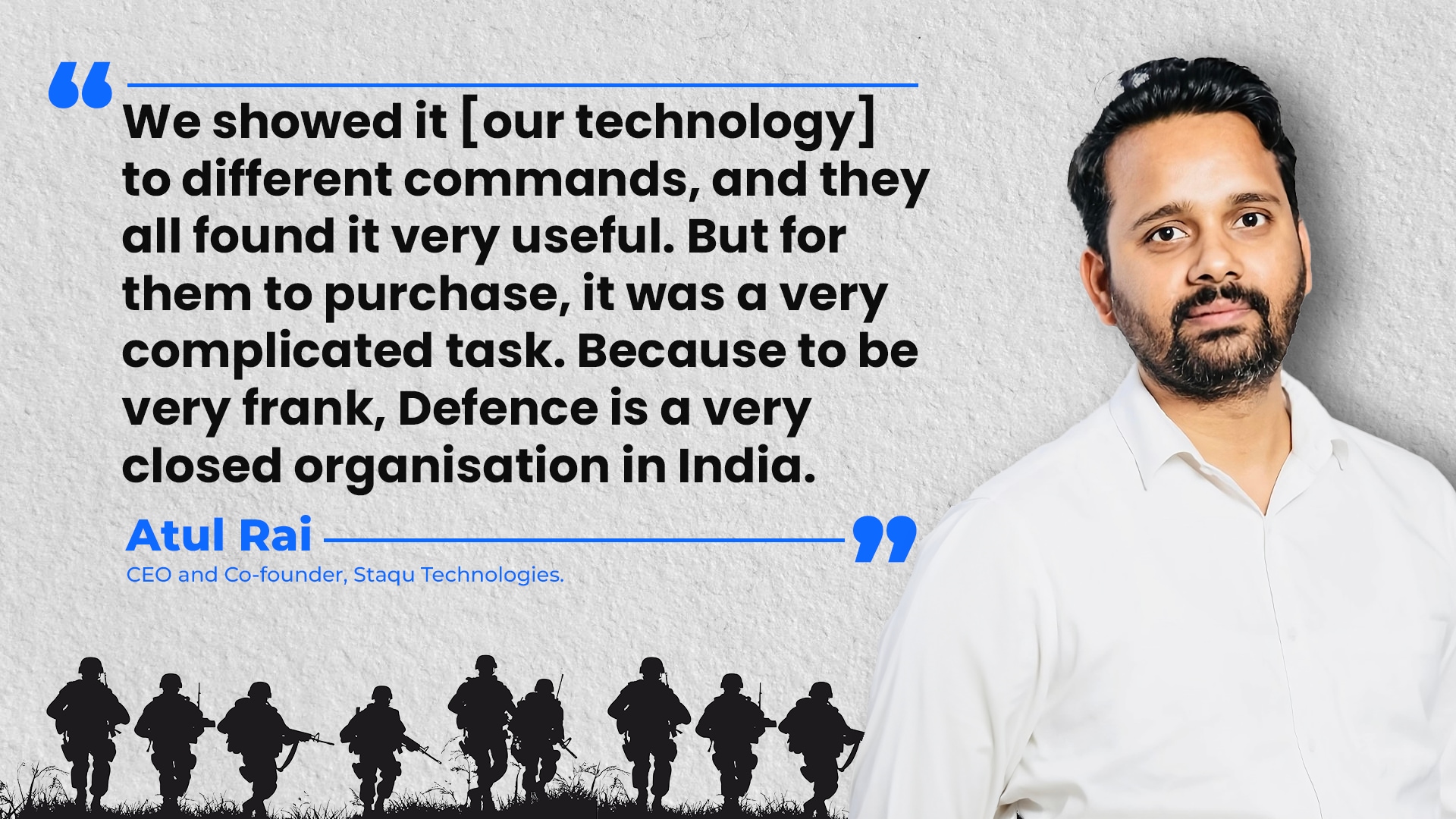
The Indian government's renewed push to indigenise procurement of equipment for the armed forces has resulted in a boom in defence startups in the country.
That's primarily thanks to iDEX—Innovations for Defence Excellence—a scheme announced by Prime Minister Narendra Modi in 2018.
Since 2021, when the scheme received budgetary allocation, 350 agreements have been signed between iDEX and startups, as of June 2024. The partnerships have resulted in the procurement of 35 items with a collective order size of at least Rs 2,000 crore, according to a release from the Ministry of Defence.
That means only about 10% of iDEX-startup agreements have resulted in material contracts. If defence startups were to survive, they needed to figure out how to commercialise their products for a wider audience or risk going belly up.
In fact, when iDEX began to roll out nearly three years ago, confidence in the ability of startups to solve defence problems was low.
.png)
(Source: Akshay Sandankar/NDTV Profit)
The 50/50 Problem
Winning an iDEX challenge is only part of a long story. Startups then need to build a production-ready prototype.
But getting there is expensive: regulatory approval, certifications, and matching the qualitative requirements of the armed forces are all requirements that need to be met. All of this is expensive and time-consuming. And this isn't even considering field trials, where it's binary: pass or fail.
“… if you win that, you win the main contract,” said Abhishek Tomar, chief technology officer at AjnaLens. The company builds AR and VR headsets across defence and enterprise use cases.
Finalising a contract seems to be the main stumbling block, whether it's through iDEX or directly liaising with Ministry of Defence departments. But locking down such contracts, which can go for up to Rs 500 crore, can provide a significant boost to companies. However, if they fail, it's time to start over or close down operations.
“..the chances of winning are 50/50 because field trials are subjective to situations, certifications, and challenges,” says Tomar, adding that AjnaLens won a contract in 2019 and its product is still going through trials.
How iDEX Works
Forging A Commercial Path
For defence startups, they either find a viable business strategy or move away from the sector entirely, like Staqu Technologies has done.
“Defence is very tough to penetrate,” says Staqu Technologies Co-Founder and Chief Executive Officer Atul Rai. “It's a very tough entry point for startups.”
The company offers a video analytics software called JARVIS which provides insights based on what CCTVs see. Their technology is used by nine state police forces, the Election Commission of India, the Bihar Forest Reserve and several companies abroad in the Middle East, Europe and the U.S.
Staqu made a submission to iDEX back in 2021-2022 but didn't win. Rai said he found the entire application complicated and the review process not very transparent though he admits that might have changed in latter iDEX challenges.

(Source: Akshay Sandankar/NDTV Profit)
Soon after, however, the company made a full pivot to homeland security, which it found was far more lucrative.
AjnaLens, on the other hand, took a more roundabout way. Their first set of contracts were with the defence sector. High-level innovation requirements made the industry a "strong starting point" to showcase "value and build credibility in other industries," according to Tomar.
Their successful defence contracts helped build a better business. "It helped AjnaLens position itself as a serious player in enterprise markets," says Tomar.
AjnaLens found that they could build for high-value enterprise use cases like workforce training, remote collaboration, and immersive learning. On the enterprise side, their AR/VR technology can help reduce training costs, enhance employee efficiency, and create better operational oversight.
Then there's Skylark Labs, a U.S.-based defense startup with operations in India. Formed by Amarjot Singh in 2021, it has several contracts with the country's armed forces.
The company has two products that it sells to clients: a defence/military application and an intelligence gathering platform that delivers insights across supply chains, social media, news, and financial markets.
Most of the company's projects in Indian defence have come through iDEX. Skylark Labs tried to do some work indirectly, but that was slow because decision-making was fragmented, according to Singh.
The company's India operations are financed via a loan through the U.S. entity because they wanted valuations at the American level. As a result, the company hasn't had any issues with funding in India.
Though the company has secured several contracts through the MoD initiative, Singh laments the lack of direct access to selling to the armed forces when they already have a commercialised product. “There is a capital procurement route, but it is very complicated. There isn't actually a good way to sell your solution directly.”
Essential Business Intelligence, Continuous LIVE TV, Sharp Market Insights, Practical Personal Finance Advice and Latest Stories — On NDTV Profit.























